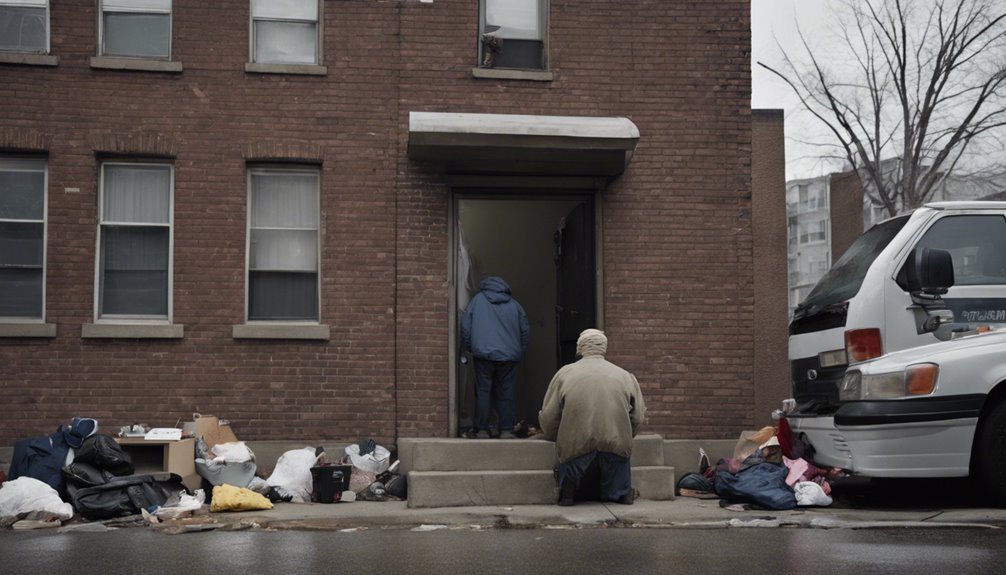When you consider evictions in Illinois, it's essential to understand the legal responsibilities that come into play, particularly regarding locksmiths. If you're a landlord or property manager, you need to follow a precise legal protocol before you think about changing locks or removing a tenant. Locksmiths are not just there for the physical task; they also guarantee that everything complies with the law. Missteps can lead to serious consequences, so what does this mean for you and your properties? Let's explore the intricacies that can impact your approach.
Key Takeaways
- Locksmiths can only change locks after a court-ordered eviction, ensuring compliance with legal standards.
- They must verify the eviction's legality before performing any lock-related services.
- Handling evictions requires locksmiths to respect tenant dignity and follow state laws.
- Non-compliance with eviction laws can lead to significant legal risks and financial penalties for landlords.
- Locksmiths must be licensed, complete training, and comply with state regulations to operate legally in Illinois.
Legal Requirements for Lock Changes

When a landlord evicts a tenant in Illinois, it's vital they understand the legal requirements surrounding lock changes. First and foremost, an eviction can't occur without a valid reason, such as non-payment of rent or lease violations. Moreover, the Illinois Residential Tenants' Rights law outlines additional protections for tenants during this process.
After serving a notice—lasting between 5 to 10 days—the tenant must have the opportunity to rectify the situation or vacate. If the tenant fails to comply, you can file an eviction lawsuit and must attend a court hearing to present your case.
Only with a court order can you proceed with eviction; self-help evictions, including changing locks beforehand, are prohibited. Once the court rules in your favor, you can request an eviction order from the sheriff's office, who'll post the order at the tenant's residence and may forcibly remove them if necessary.
After the eviction, this is where locksmiths come into play. Once the eviction is executed, locksmiths must change or rekey the locks immediately. Their involvement guarantees that the evicted tenant can't return, providing you peace of mind. Additionally, commercial evictions often involve more complex lease agreements and different rules, highlighting the importance of understanding your specific situation.
Furthermore, as outlined in Public Act 97-470, if you plan to lease out the property again, it's mandatory to change or rekey locks after the previous tenant moves out. Failure to do so could expose you to liability for any theft-related damages. Additionally, you must ensure that the new locks comply with local building codes to avoid further complications. In some cases, tenants have the right to request lock changes if they feel unsafe.
Consequently, prioritizing secure lock changes not only complies with the law but also protects your property for future tenants.
Tenant Lock Modifications

[Tenant lock modifications in Illinois can be a complex matter, particularly when it comes to maneuvering legal requirements and lease agreements. If your lease explicitly permits it, you can change the locks under certain conditions.
For instance, if you face an imminent threat of domestic or sexual violence, you'll need to provide written proof—like medical records or a police report—along with a formal notice to your landlord. If you're threatened by someone in your unit, a protective order is necessary. Additionally, it may be essential for tenants to understand the role of locksmiths during evictions to ensure they follow appropriate procedures. In Illinois, key duplication laws may also impact your ability to secure your residence effectively.
Once you notify your landlord, they've 48 hours to change the locks or give you permission to do so. If they don't respond, you can lock yourself out without needing their approval. However, remember that you must make a good faith effort to provide your landlord with a new key afterward. Additionally, the landlord's timely action is crucial to ensure tenant safety, as their failure to comply may result in your right to change the locks independently.
If your lease doesn't allow for lock changes or requires prior notification and compliance with specific lock standards, you'll need to follow those rules or risk penalties, including fines or eviction.
Your landlord also retains the right to access your unit for emergencies, inspections, or necessary repairs, emphasizing the importance of providing new key access.
In managing lock modifications, prioritize clear communication with your landlord and budget for potential lock change costs as outlined in your lease. Always familiarize yourself with local regulations to guarantee compliance while maintaining your security.
Eviction Process Overview

Understanding the eviction process is essential if you're managing tenancy issues in Illinois. It involves several legal steps, starting from the initial notice and culminating in the execution of an eviction order. The timeline can vary considerably, typically taking anywhere from two weeks to five months, depending on the circumstances. A landlord may file an Eviction Complaint with the county Circuit Court after the notice period expires, initiating the legal proceedings. A critical aspect of this process is ensuring that any locksmith engaged in changing locks complies with Illinois locksmith regulation to maintain professionalism and trustworthiness. Additionally, it is crucial for locksmiths to be aware of the specific regulations for digital and smart locks to ensure compliance with the evolving technological landscape.
Legal Steps in Eviction
While maneuvering the eviction process in Illinois, landlords must follow a series of legal steps to confirm compliance with state regulations. The eviction journey begins with issuing a notice. Depending on the situation, you might use a 5-Day Notice to Quit for unpaid rent, a 10-Day Notice to Vacate for lease violations, or a 10-Day Notice to Comply or Vacate for minor violations. It is crucial to ensure that the locks meet essential lock safety standards to avoid any complications.
| Step | Description |
|---|---|
| Issuing the Notice | Deliver or mail the appropriate notice and keep proof of service. |
| Filing an Eviction Lawsuit | File in the circuit court with required documents and pay the filing fee. |
| Serving the Tenant | Guarantee timely service of summons through an authorized individual. |
| Hearing and Judgment | Attend the hearing with evidence; the judge issues an eviction order based on findings. |
Adhering to these steps is vital. Each action must align with state laws, and it's important to maintain proof throughout the process. Pay attention to local regulations, as they may influence how you proceed. Following these guidelines helps you navigate the complexities of eviction effectively. Additionally, landlords must ensure that any locksmith used during the eviction process is authorized locksmithing to avoid legal repercussions in Illinois.
Timeline for Eviction Process
The eviction process in Illinois involves a structured timeline that landlords need to navigate carefully. The first step is to serve a notice, which varies based on the reason for eviction. For nonpayment of rent or illegal activity, you must provide a 5-day notice.
If it's a lease violation, allow 10 days, and for health or safety issues, you'll need to issue a 14-day notice. For tenants without a lease or at the lease's end, a 30-day notice is required. During this process, landlords should also familiarize themselves with the licensing requirements for locksmiths to ensure compliance with Illinois regulations.
Once notice is given, the court proceedings begin. You can expect to obtain a summons within 3 to 40 business days. A hearing typically occurs 7 to 40 days after you file your lawsuit, followed by a court ruling in about 14 business days.
If the court rules in your favor, you'll receive an eviction order within 7 days. Tenants generally have 7 to 14 days to vacate.
The total eviction timeline can range from as little as 2 weeks to as much as 5-6 months, heavily influenced by the specific circumstances, tenant response, and court schedules. Additionally, landlords must ensure that any locksmith services used during the eviction comply with ADA regulations to accommodate all tenants safely and fairly.
Role of Locksmiths

Locksmiths play an essential role in the eviction process in Illinois, guaranteeing that all actions taken adhere to legal requirements. They are integral to maintaining the integrity of the process, providing services only after the eviction has been court-sanctioned. Your locksmith must verify the legality of the eviction before proceeding, guaranteeing that they comply with the Illinois Forcible Entry and Detainer Act.
Here's a quick overview of the responsibilities and roles locksmiths fulfill:
| Aspect | Details | Importance |
|---|---|---|
| Legal Verification | Confirm the eviction is court-ordered | Guarantees compliance with legal requirements |
| Change Locks | Rekey or install new locks to secure the property | Prevents unauthorized re-entry |
| Professionalism | Handle sensitive situations with care | Respects tenant rights and dignity |
| Insurance | Maintain liability insurance as per state requirements | Provides legal protection |
| Compliance | Follow state regulations and licensing requirements | Guarantees operational legitimacy |
Working efficiently, locksmiths complete the job promptly after the eviction while respecting tenant rights. Landlords must provide adequate notice to tenants before locksmith involvement, guaranteeing tenants have time to prepare for relocation. The locksmith's actions not only protect the landlord's property but also reinforce the legalities surrounding the eviction process. This careful adherence to protocols helps maintain a sense of order and fairness in what can be a distressing situation for all parties involved.
Consequences of Non-Compliance

When you don't comply with eviction laws, you risk significant legal liability as a landlord.
This non-compliance can lead to financial penalties and may require you to pay damages to tenants affected by your actions.
Being aware of these consequences can help you navigate the eviction process more effectively.
Legal Liability Risks
Understanding the legal liability risks associated with eviction processes is vital for landlords in Illinois. Ignoring regulations can lead to significant consequences that jeopardize both your position and your financial stability.
Here are some key legal risks to keep in mind:
- Court Determined Damages: Engage in illegal evictions, and courts may award actual damages to tenants.
- Forcible Entry Charges: Changing locks without a court order can result in serious legal repercussions.
- Retaliatory Eviction Prohibition: Evicting tenants for exercising their legal rights can invoke severe penalties.
- Mandatory Mediation Non-Compliance: Failure to participate in mediation may complicate or nullify your eviction process.
If you take shortcuts or act unlawfully during an eviction, you're not just endangering your reputation; you could be liable for damages or face criminal charges.
Courts can prevent you from proceeding further, leaving you to restart the process and incur more costs.
Therefore, familiarizing yourself with the laws is essential to protect your interests while respecting tenant rights.
Always approach eviction with a clear understanding of legal requirements to mitigate risks effectively.
Financial Penalties Enforced
Failure to comply with Illinois eviction laws can lead to significant financial penalties for landlords, particularly regarding required notice periods. If you don't provide the proper notice—like the mandatory 14-day rent non-payment notice—you risk delaying or invalidating the entire eviction process. This creates opportunities for tenants to challenge your actions and even have the eviction dismissed in court.
Here's a snapshot of possible financial repercussions you might face if non-compliance occurs:
| Type of Cost | Amount | Implication |
|---|---|---|
| Filing Fees | Varies by county; necessary cost | Increases if not paid timely |
| Attorney's Fees | $500 to $10,000+ | Failure to follow can spike costs |
| Lock and Enforcement Fees | Approx. $260-$460 | Pays for locksmith and sheriff's services |
| Additional Costs | Storage fees for abandoned property | Adds unexpected financial burdens |
Understanding and adhering to these laws is essential. Financial missteps can not only inflate costs but also hinder your ability to reclaim your property efficiently.
Locksmith Licensing Requirements

To become a licensed locksmith in Illinois, you must meet several eligibility criteria and complete specific steps. Here's an overview to guide you through the process:
- Age Requirement: You need to be at least 18 years old.
- Moral Character: Demonstrate good moral character without felony convictions for at least ten years.
- Education Requirements: Complete a training course and pass a licensing exam.
- Background Check: Undergo a fingerprint-based criminal history check.
First, ascertain you meet the age and character requirements. If you've had a felony conviction, a decade must have passed since your sentence was fully discharged.
You can then enroll in an approved 20-hour basic locksmith training course, recommended though not mandatory.
The next vital step is passing a licensing examination, which covers theory and practical aspects of locksmithing. The exam features 305 questions and is held twice a year. Remember to apply at least 60 days in advance.
Don't forget about the background check; you'll submit fingerprints to the Illinois Department of Financial and Professional Regulation (IDFPR). Along with that, you'll need to pay application and examination fees totaling up to $300 while also providing proof of at least $1 million in general liability insurance.
Lastly, if you aim to operate a locksmith business, you'll need agency registration, guaranteeing all partners are licensed locksmiths.
Being proactive in understanding these requirements will help you navigate the licensing process successfully.
Best Practices for Landlords

While steering through the complexities of property management, adopting best practices for landlords is essential to fostering a positive landlord-tenant relationship and ensuring compliance with legal requirements.
Start by understanding the legal grounds for eviction. Always have a valid reason—such as non-payment of rent or lease violations—before initiating eviction proceedings.
Implement proper notice requirements. For non-payment, provide a 5-day pay or vacate notice; for lease violations, issue a 10-day notice. Make sure to serve these notices personally, via certified mail, or post them on the property when necessary. Clearly state the amount due and the termination date to avoid confusion.
Know your role when it comes to legal proceedings. If a tenant doesn't comply after the notice period, file for eviction in court. Attend the hearing, as both parties need to present their cases. Remember, only a sheriff can conduct the actual eviction—self-help methods are illegal.
Maintain clear communication with your tenants. Address issues promptly and consider mediation before escalating to eviction. This can help mitigate conflicts and build trust.
Finally, educate yourself about tenant rights and local regulations. Understanding protections against retaliatory or discriminatory evictions can prevent legal troubles.
Frequently Asked Questions
Can Tenants Change Locks Without Landlord Permission?
You generally can't change the locks without your landlord's permission, as it usually violates your lease agreement.
If you do, your landlord might change the locks back and charge you for it.
However, if you face imminent threats to your safety, you can request a lock change.
Be mindful that keeping your landlord informed and complying with their requirements is essential to avoid legal disputes and potential damage liability.
What Recourse Do Tenants Have Against Uncompliant Landlords?
When the going gets tough, you must stand your ground.
If your landlord's not complying with the law, you've got options. Document everything, from missed repairs to unprovided notices, and gather evidence.
You can file a complaint with local housing authorities or pursue a lawsuit for damages. Consider seeking legal representation; they can navigate you through the process.
Are There Exceptions to Lock Change Laws During Emergencies?
In emergency situations, there aren't exceptions to lock change laws.
You can't just change locks without a court order, as self-help evictions are prohibited. Even during emergencies, following legal protocols is essential.
If you've lost keys or tenants have changed locks, you'll need a locksmith to access the property legally.
How Can Tenants Protect Their Belongings During an Eviction?
When the storm clouds of eviction gather, you can safeguard your belongings by acting swiftly.
Reach out to your landlord to negotiate the retrieval of personal items, and document everything in writing. Keep a record of your possessions for clarity.
Utilize local resources or legal aid to understand your rights, ensuring you're not left in the dark.
Communicate your plans effectively, and consider having a friend help with retrieval logistics.
What Should Landlords Do in Case of Locksmith Service Delays?
If you encounter locksmith service delays, promptly communicate with the locksmith to understand the reasons.
It's essential to have a backup plan—consider contacting another licensed locksmith if delays persist.
Make sure you've followed all legal procedures upfront to avoid complications.
Keep your local law enforcement in the loop, so they're prepared, and stay informed about the situation.
Conclusion
In Illinois, sticking to the legal eviction process is essential for landlords to avoid hefty fines and legal troubles. Did you know that nearly 60% of evictions can result in costly litigation for landlords who don't follow the law? By understanding the roles of locksmiths and the legal requirements involved, you can protect your property and guarantee a smooth shift post-eviction. Always prioritize compliance to safeguard your investments and respect tenant rights.









